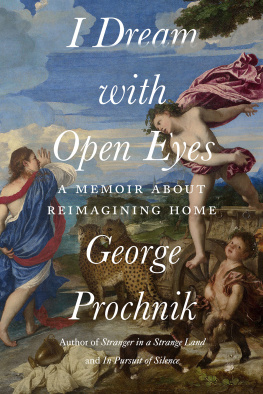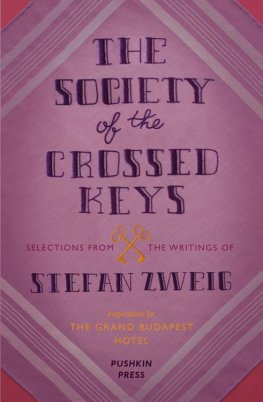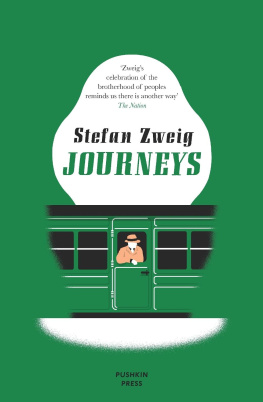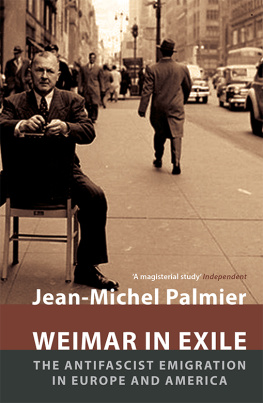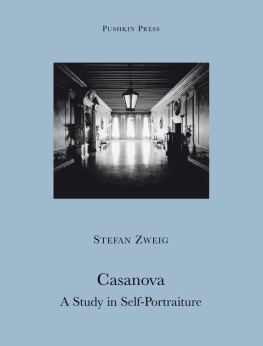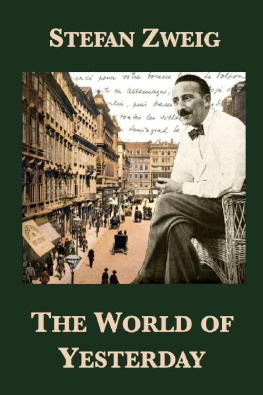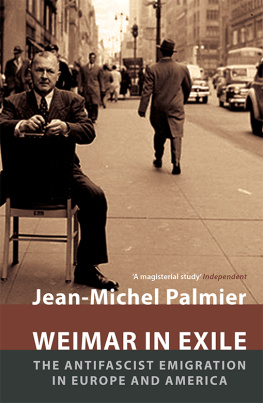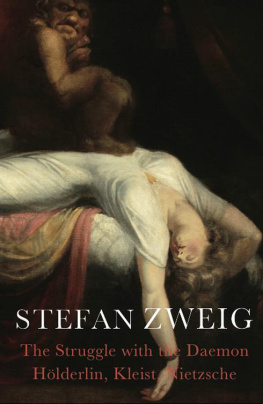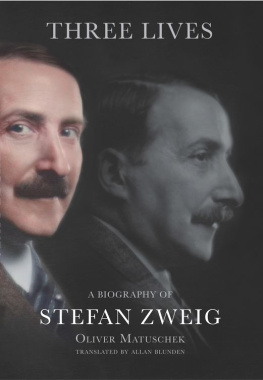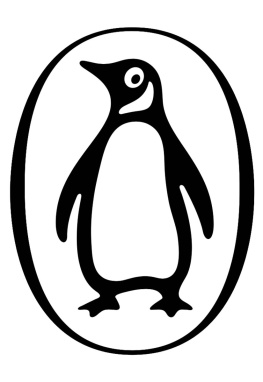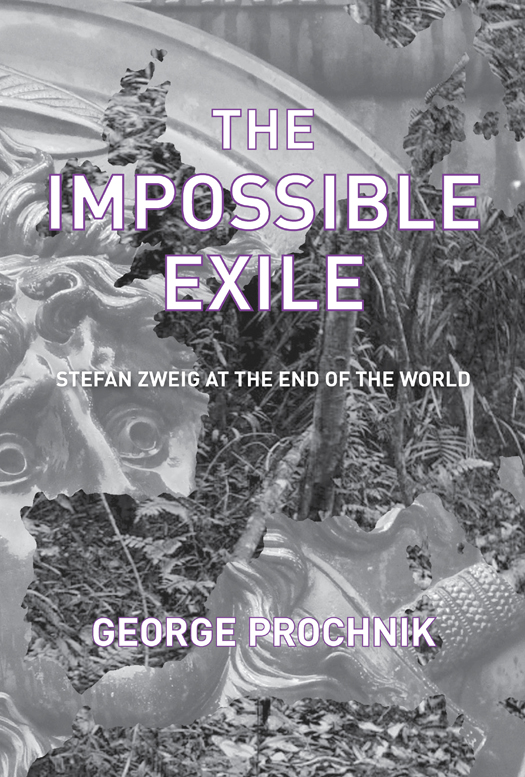Praise for The Impossible Exile
Cosmopolitan was a dirty word, indeed a code word, to the xenophobes, fascists, and anti-Semites of Europe between the two world wars. No one embodied cosmopolitanism more charismatically than the prodigious Viennese writer and humanist Stefan Zweig. When the Nazis invaded Austria, Zweig was exiled from his native country. In the course of the last century, he has been exiled from his rightful place in world literature. In this enthralling and meticulous biography, George Prochnik brings the exile home.
Judith Thurman, author of Isak Dinesen: The Life of a Storyteller, winner of the National Book Award for Non-Fiction
In his sensitive, emotionally astute, and strikingly stylish account of Stefan Zweigs exile, George Prochnik manages to convey, better than virtually any other author Ive read on the subject, the awful intellectual and emotional costs of wartime displacement. Meticulously shadowing its subjects poignantly improbable zigzaggingfrom prewar Vienna to rural upstate New York, from the 1939 Worlds Fair to the remote Brazilian village where Zweig finally ended his lifeThe Impossible Exile enacts the process of disintegration by which one of Europes greatest literary celebrities became one of the hopeless, cultureless emigrs whom Goebbels derided as a cadavers on leave. Not the least memorable aspect of this book is the remarkable way in which the author uses his own familys wartime past as a means of gaining insight into what is, to most of us, an unimaginable kind of loss. A remarkable work of biographical empathy and imagination.
Daniel Mendelsohn, author of The Lost: A Search for Six of Six Million
George Prochnik has taken the conventions of literary biographyusually, in fact, the last word in conventionalityand turned them inside out to create a fast-paced, tension-filled, almost novel-like exploration of a writers personality. That this writer is Stefan Zweig, strangest and most tortured of all German-speaking writers of his time, makes his book doubly gripping.
Lawrence Osborne, author of The Forgiven
Subtle-minded and unsentimental, Prochnik makes some sense out of the enigmatic Zweig. The sense is exile, which, though a genies lamp to some writers, has been a deathblow to others, notably Zweig, who, fleeing the Nazis, ended in a double suicide with his wife. The biography is nestled in excellent mini-essays on Zweigs world: journalism, the coffeehouse culture, Viennese snobbery, Jewish snobbery. In turn, that story is embraced by Prochniks own: growing up in America in a family that had escaped Austria after the Anschluss. The book is in the bloodline of W. G. Sebald.
Joan Acocella, of The New Yorker
The Impossible Exile, a brilliant biographical meditation, operates with the hypnotic force of a mystery novel, suspensefully reconstructing an already committed crime. Prochniks style is at once speedy and ruminative: he combines the risk-loving lan of a beatnik genius, and the majestic hauntedness of Walter Benjamin. I am wonderstruck by the erudition and tender feeling that underlie Prochniks masterful account of perpetual, tragic wandering.
Wayne Koestenbaum, poet and critic
George Prochniks The Impossible Exile is a deeply researched and beautifully written exploration of the life of the Austrian writer Stefan Zweig, once beloved around the world and now nearly forgotten. Rather than writing a straightforward biography, Prochnik brings in elements of his own family history of exile as well as his thoughts on the art of writing biography to create a work that is as sensitive and exquisite as Zweigs novellas.
Ruth Franklin, contributing editor at The New Republic
A thrilling blend of literature, cultural history, and biography, The Impossible Exile casts a compassionate and slyly contemporary light on what it means to be torn from ones life and home. Prochnik teaches us as much about intellectual life in America in the 1930s and 1940s as he does about Stefan Zweigs beloved Vienna before the war. He is especially insightful on the psychological cost of exile, the loss of self, of fame, of relevance, that beset Zweig and his brilliant coterie of displaced Viennese and German artists, composers, and writers.
Michael Greenberg, author of Hurry Down Sunshine and Beg, Borrow, Steal
This is a beautifully written, deeply felt, and ultimately tragic love story about a deracinated Jewish writer wildly in love with European culture, who discovers, too late, that European culture does not love him back. What makes The Impossible Exile doubly tragic is the way that Zweig mistook his best self for Europe, just as Europe was mistaking its worst self for Zweig. The double suicide that resulted is, in Prochniks expert hands, as fascinating as it is unsettling.
Jonathan Rosen, author of The Life of the Skies
A deeply moving study of one writers struggle to adapt to a life outside the European culture whose values he helped create. In The Impossible Exile, George Prochnik has illuminated the facts of Stefan Zweigs life and work with his own familys experience of exile, creating a remarkably rich, multidimensional portrait of loss, longing, and despair.
Sherill Tippins, critically acclaimed author of February House and Inside the Dream Palace
The Impossible Exile is not only a riveting study of one of the major literary migrs of the Nazi era, but also a profound meditation on the nature of fame, the intersection of politics and art, and the condition of exile itself. Tracing the final, tumultuous phase of Zweigs career from cosmopolitan Vienna to the small city in Brazil where he met his melancholy end, Prochnik brings a sympathetic but unsparing eye to his subject and in the process makes the best case Ive read for the continued importance of this cultured, humane, yet fascinatingly complicated figure.
James Lasdun, author of Give Me Everything You Have
This elegant and very engaging book lays out with great sensibility Zweigs descent into intellectual paralysis and self-destruction. It is at once an excellent intellectual and personal account which also serves as a convincing portrait of modern Europes darkest days.
Patrice Higonnet, Goelet Professor of French History at Harvard University and author of The Four Centuries History of a French Protestant Village in Southern Europe
Though he escaped the madness of Hitlers Europe, Stefan Zweig was a war casualty nonetheless, succumbing to the exiles humiliating erasure as he tried to find his way in North and South America. In this learned and luminous volume, George Prochnik uses the last, tragic phase of Zweigs career as a metaphor for the condition of exile itself. Part literary biography, part cultural history, part meditation on war, art, and death, The Impossible Exile gives us the pulse and fever of Zweigs desperate and fascinating days.
David Laskin, author of The Family: Three Journeys into the Heart of the Twentieth Century
It would have been enough to rescue Stefan Zweig from his undue obscurity and to bring him virtually to life for a new generation of readers. George Prochnik has accomplished this and much more: viewing the popular literary titan of pre-Anschluss Vienna from the revealing perspective of his desperate final wanderings through France and England, New York and Brazil, he renders Zweig as the flawed but fascinating hero of his own tragedy as well as an exemplary character in the centurys agonies. With vast scholarship and a light touch, an incisive eye for the telling anecdote and a poignant reflection of his familys immigrant legacy, Prochnik illuminates every place and time he glances at, including the present day, and offers surprising angles on the big questions: the American character, Jewish identity, the Viennese cultural heritage, the pressure of political engagement in trying times, the crucial and enduring experience of exile.


